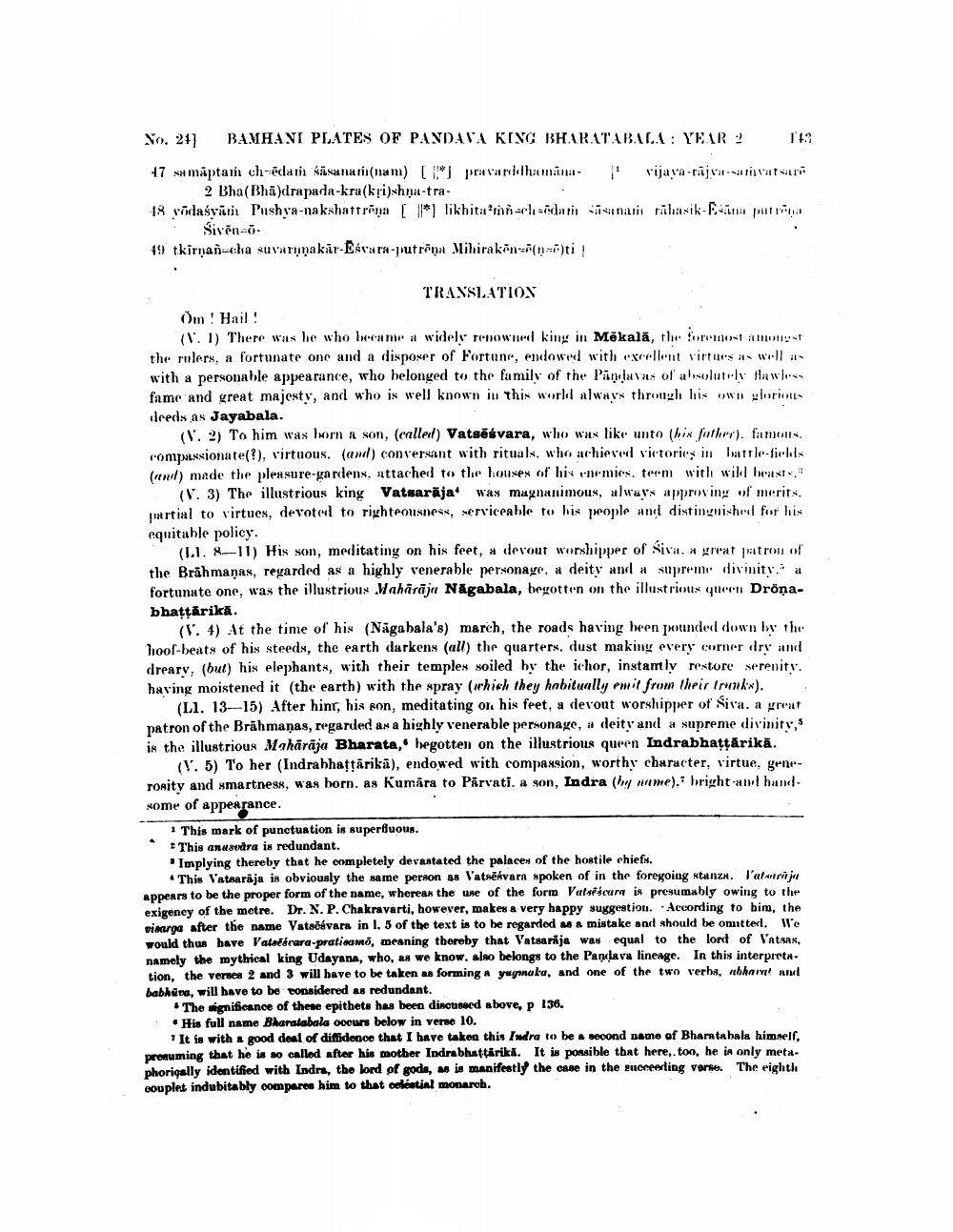________________
No. 21) BAMHANI PLATES OF PANDAVA KING BHARATABALA: YEAR? 113 47 sa măptam ch-ēdami sāsanari(nam) [ ] pravardhaman
rijava-tajva-samvatstre 2 Bha(Bhā)drapada-kra(kļi)shna-tra18 vādaśyāri Pushya-nakshattræna ( 1*likhita?mn=rl=rdari sisitmanii rahasik-Esama putrina
Sivēn-o. 49 tkirnancha suvuropakar-Esrara-putrina Mihirakin t i!
TRANSLATION Öm! Hail!
(1.1) There was he who became a widely renowned king in Mēkalā, the foremost amongst the rulers, a fortunate one and a disposer of Fortune, endowed with rellent virtues as well as with a personable appearance, who belonged to the family of the Pandavas of absolutely flawless fame and great majesty, and who is well known in this world always through his uw vlorious deeds as Jayabala.
(V.?) To him was born a son, (called) Vatsēśvara, who was like unto his father). famous. compassionate(?), virtuous. (and) conversant with rituals, who achieved victories in battlefields (and) made the pleasure-gardens, attached to the houses of his enemies. term with will beast
(V. 3) The illustrious king Vatsarājat was magnanimous, always approviny of merits. partial to virtues, devoted to righteousness, serviceable to his people and distinguished for his equitable policy.
(LI. _11) His son, meditating on his feet, a devout worshipper of Niva, great patron of the Brāhmaṇas, regarded as a highly venerable personage, a deity and #supreme divinity. a fortunate one, was the illustrious Maharaja Nagabala, begotten on the illustriou queen Dröna. bhattărikā.
IV. 4) At the time of his (Nagabala's) march, the roads having been pounded down by the hoof-beats of his steeds, the earth darkens (all) the quarters, dust making every corner dry and dreary, (but) his elephant, with their temples soiled by the ichor, instantly restore serenity. having moistened it (the earth) with the spray (schich they habitually emit from their traukx).
(L1. 13---15) After hinr, his son, meditating on his feet, a devout worshipper of Siva. a great patron of the Brāhmaṇas, regarded as a highly venerable personage, a deity and at supreme divinity, is the illustrious Mahārāja Bharata, begotten on the illustrious queen Indrabhattărikā.
(1. 5) To her (Indrabhattărikā), endowed with compassion, worthy character, virtue, generosity and smartness, was born, as Kumāra to Pârvati, a son, Indra (by name). bright and handsome of appearance.
This mark of punctuation is superfluous. This anusvara is redundant. • Implying thereby that he completely devastated the palaces of the hostile chiefs.
• This Vataarkja is obviously the same person as Vatsēkvara spoken of in the foregoing Mtanza, l'aleriju appears to be the proper form of the name, whereas the une of the form Vatréseum is presumably owing to the exigency of the metre. Dr. N. P. Chakravarti, however, makes a very happy suggestion. According to him, the vimrga after the name Vatsobvara in l. 3 of the text is to be regarded as a mistake and should be omitted. We would thus bave Valasrara-praticano, meaning thereby that Vatsaraja was equal to the lord of Vatsas, namely the mythical king Udayana, who, as we know. also belongs to the Pandava lineage. In this interpreta tion, the versen 2 and 3 will bave to be taken as forming A yugnaka, and one of the two verba, abhar! anul babhina, will have to be considered as redundant.
The significance of these epithets has been discussed above, p 136. • His full name Bharalabala occurs below in verse 10.
1 It is with a good deal of diffidence that I have taken this Indra to be a second name of Bharta bala himself, prenuming that he is so called after his mother Indrabhattariki. It is possible that here, too, he is only metaphorically identified with Indrs, the lord of gode, as is manifestly the case in the rucneerling verse. The eighth couplet indubitably compares him to that celestial monarch.




